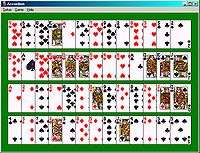Accordion (solitaire)
| A Patience game | |
|
Screenshot of Accordion | |
| Family | Non-Builder |
|---|---|
| Deck | Single 52-card |
| See also Glossary of solitaire | |
Accordion is a solitaire game using one deck of playing cards. The object is to compress the entire deck into one pile like an accordion.
Rules
There are two variants of the game in terms of how the game begins.
In one variant, the cards are laid out one by one and are immediately put into play if possible. The number of cards to be laid out range from just one card to how many cards the width of the table can allow (usually a second or third row is constructed in the process). While practical, it also allows an element of surprise as the player does not know the next card to be dealt until all possible plays are exhausted.
In another variant, the cards are spread out in one line. While this variant allows for some tactics to be applied, it can prove to be cumbersome when played with a real deck.
No matter the layout variant, the game is the same. A pile can be moved on top of another pile immediately to its left or separated to its left by two piles if the top cards of each pile have the same suit or rank. Gaps left behind are filled by moving piles to the left.
Here's an example:
| 5♠ | 6♠ | 10♦ | 5♥ | K♣ |
According to this example, either 6♠ or 5♥ can be placed over 5♠. These are the only allowable moves.
The game is won when all cards are compressed into one pile. But since achieving this is next to impossible when cards are dealt one at a time, Alfred Sheinwold mentions in his book 101 Best Family Card Games (ISBN 0-8069-8635-2) that it is considered a win when there are five piles or less at the end of the game.
Tips & Strategies
Before you start playing, locate 4 cards with the same rank that are close and near the end of the layout. Try to get the 4 cards to the end of the layout. You do not want to cover them with other cards until the end of your game.
Alternative Names
- Idle Year
- Tower of Babel
- Methuselah
See also
References
- "Accordion Solitaire." Tesseract Mobile. Tesseract Mobile, n.d. Web. 9 July 2015.
- "Accordion Solitaire." BVS Solitaire Collection. BVS Development Corporation, n.d. Web. 9 July 2015.
- "Accordion." SolSuite. TreeCardGames, n.d. Web. 9 July 2015.

